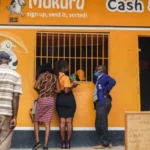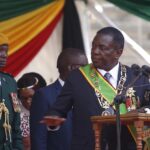HARARE – President Emmerson Mnangagwa surprised Zanu PF members at the ruling party’s national assembly on Friday when he chanted the slogan: Pasi ne zviganada, signalling a potential shift in the political landscape. This comes as war veterans have vowed to resist alleged efforts by businesspeople with questionable morals to takeover of Zanu PF amid concerns about the growing influence of money in contests for leadership positions.
The term “zvigananda,” popularised by Vice President Constantino Chiwenga, has since become shorthand for tenderpreneurs and members of the elite accused of corruption or benefiting from state capture. Chiwenga, who is battling efforts to sideline him in the race to succeed President Emmerson Mnangagwa, has been on a war path against people that he says are flaunting unexplained wealthy.
Chiwenga last month told the Zimbabwe National Chamber of Commerce congress in Victoria Falls that the country was witnessing a worrying culture of people who are increasingly becoming wealthy with no known businesses. In February he described such businesspeople as zvigananda, Shona word for blood sucking ticks.
Samuel Parirenyatwa, secretary-general Zimbabwe National Liberation War Veterans Association, said the former fighters will not remain quite about the growing influence of the businesspeople buying positions in the party.
“We went through hell during the war to liberate this land,” Parirenyatwa told The Standard. “We fought with and for the masses of Zimbabwe, not a few individuals. We are aware of the spirited efforts by the zvigananda to infiltrate and take over the party. This is doomed to fail. Zanu PF’s ideology is people centred and is meant to protect the masses from these zvigananda.”
He said the former liberation war fighters were alarmed that Zanu PF was now being used as a conduit to rob the masses. “We get extremely worried to notice our party being used as a conduit to rob the people from the gains of their independence,” Parirenyatwa said.
“Sons and daughters of this land lost their lives, were maimed, and went through hell to bring about this independence being abused by a few individuals. What is most worrisome is splashing of huge amounts of money for luxuries by the zvigananda in a national economy, which is failing to take care of the sick.”
Controversial socialite Wicknell Chivayo has described himself as a “chigananda” in a photo he posted on his social media platforms, where he’s seen posing in front of a private jet.
Interestingly, Chivayo isn’t the first prominent figure to embrace the label. Business tycoon Kudakwashe Tagwirei has also reclaimed the term, even publicly referring to allies like Obey Chimuka as “zvigananda.”
Political analyst Charlin P. Chikomo described Tagwirei’s use of the term as “a calculated display of power,” suggesting that in Zimbabwe’s political language, such symbolic gestures are rarely accidental. He wrote on X:
“By parading his associates under a term allegedly coined by Chiwenga in critique, Tagwirei wasn’t just embracing the insult; he was weaponizing it.”
He characterised the move as an act of political theatre—one that transforms ridicule into rhetoric and turns subversion into a public spectacle. Said Chikomo:
“It reads less like reconciliation and more like a strategic act of dominance: “Yes, we are Zvigananda. So what? Now what?”
Chikomo believes the statement could be testing allegiances and sending a message far beyond the immediate circle. He said:
“In Zimbabwe’s political terrain, such a public gesture sends waves far beyond the stage—it tests silence, measures allegiances, and dares response. Whether this signals a shift in the internal balance of power within ZANU PF or simply reflects unchecked arrogance remains to be seen. But one thing is certain: power, in its rawest form, is often performed long before it’s declared.
“If Chiwenga coined the term as criticism, and Tagwirei now wears it as a crown, then the narrative has shifted—whether temporarily or structurally. In a system where symbolism speaks louder than press statements, this move feels like more than bravado. It may be a signal that the old rules of reverence and restraint are being rewritten—or, more dangerously, ignored.”
Most of the wealthy businesspeople that joined Zanu PF after the coup that toppled Robert Mugabe are believed to be backing a faction that wants Mnangagwa to remain in power until 2030.

Follow @MyZimbabweNews











